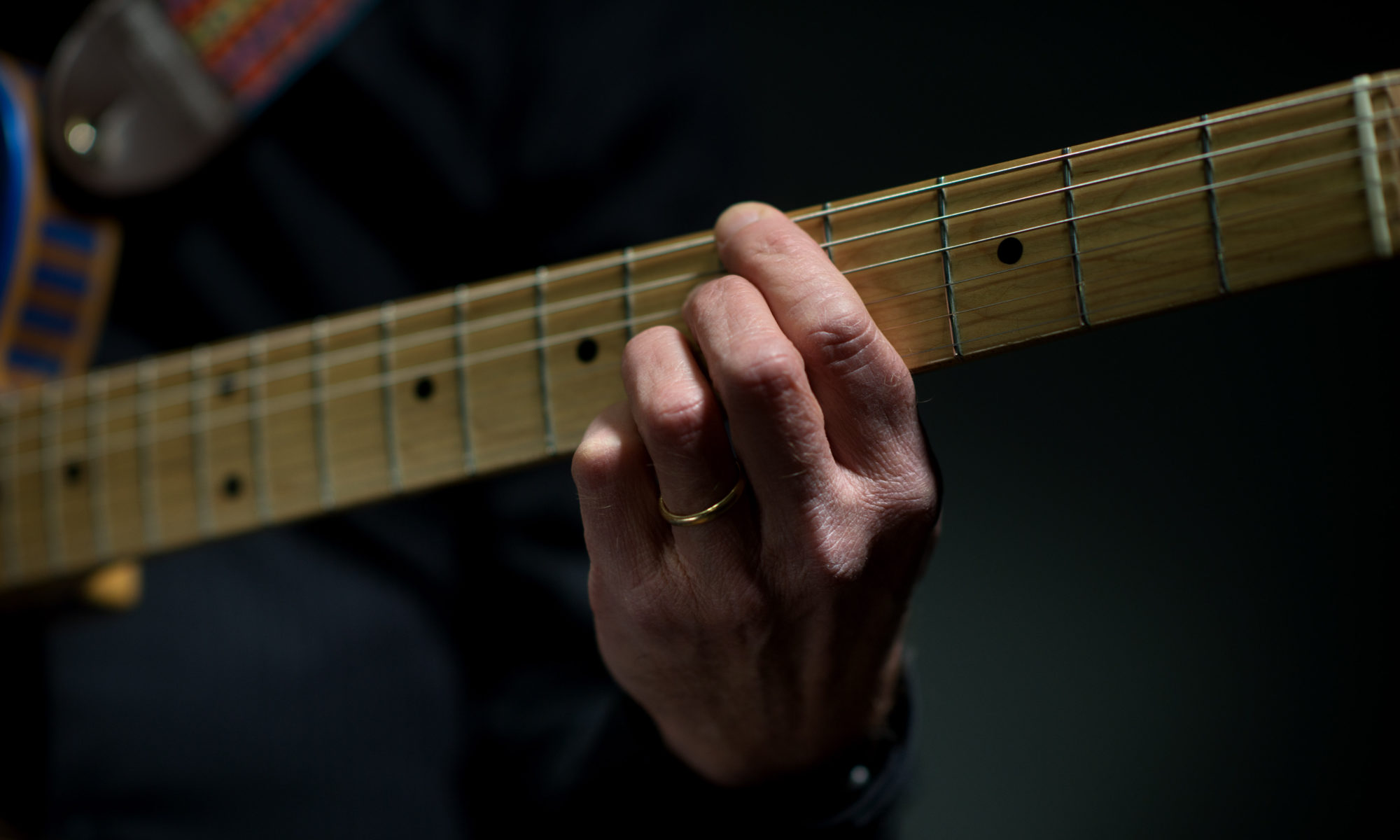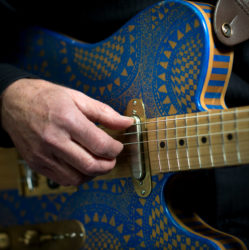Welcome! Here you will find information about past and current projects. Thanks for looking!
Alex Coke & Carl Michel Sextet
ALEX COKE & CARL MICHEL SEXTET
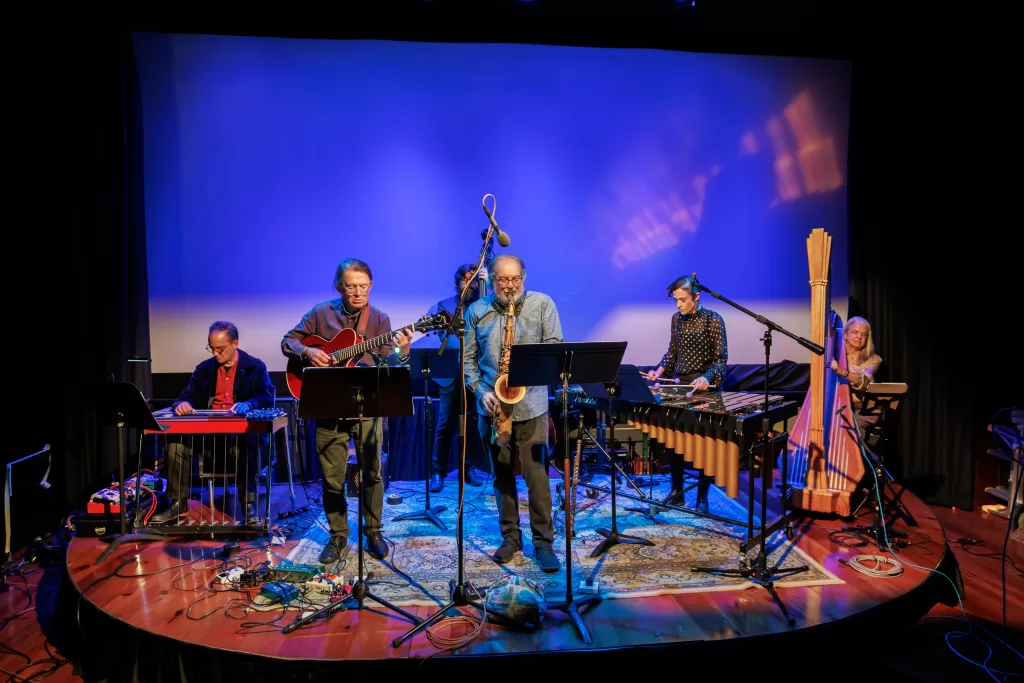
Performance Schedule


“Situation” Live at The Rosette Jan. 31, 2025 on YouTube
Read A Review of “Situation” at Roots Music Report
Nice Review at Contemporary Fusion Reviews
Nice Review by Jerome Wilson at All About Jazz
NEW RELEASE SITUATION
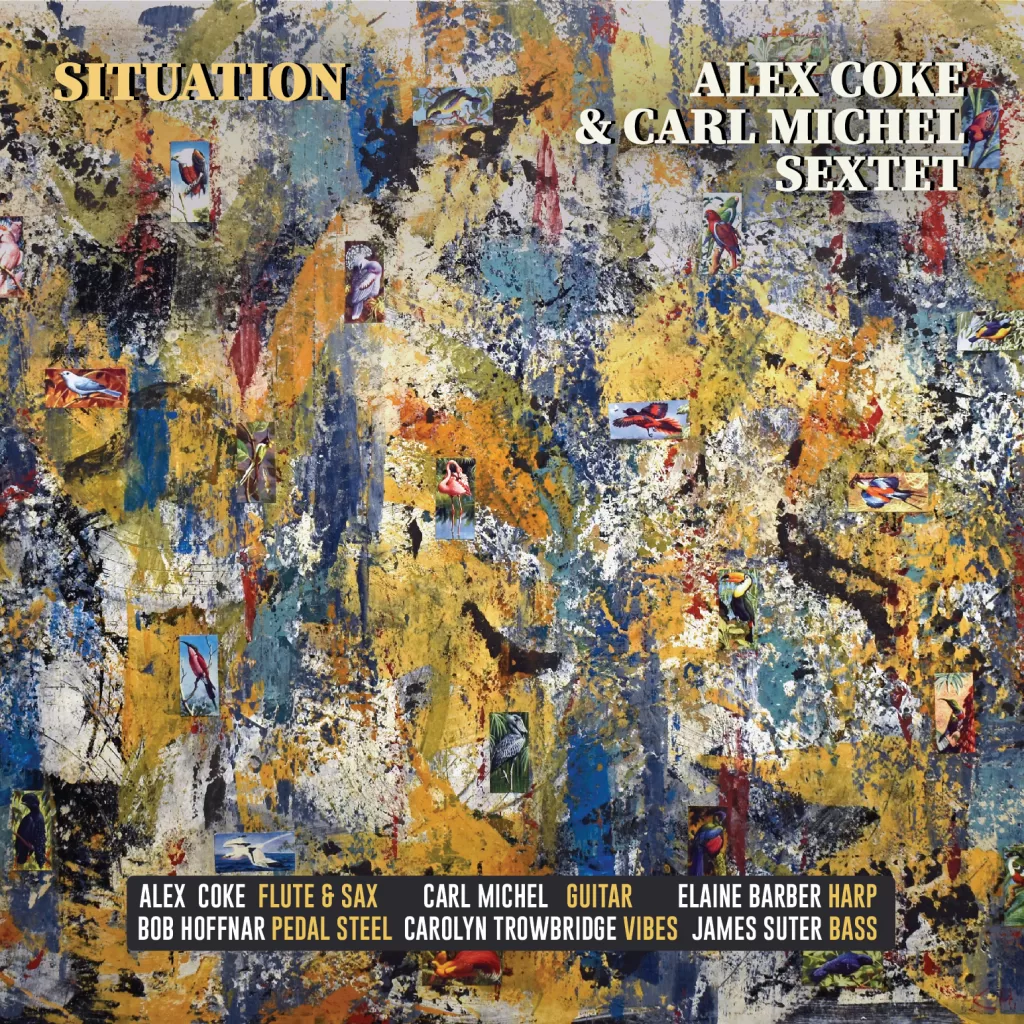
STREET DATE JANUARY 29, 2025 AVAILABLE AT BANDCAMP
“The collection is all at once weird and wonderful, strange and engaging, distracting and magnificent – truly capturing the spirit of free jazz for the modern era!” – Jonathan Widran (JW Vibe)
PAST PERFORMANCES:
Soundspace at Quacks, 5326 Menchaca Rd., Austin TX Saturday March 15, 2025
Chamber Music America Showcase
Thursday, February 13, 8-9:30 PM
Eldorado Ballroom, 2310 Elgin St., Houston TX
Jan. 31, 2025, “Situation” album release performance at The Rosette, Austin, TX. and at Waterloo Records on Jan. 29, 2025.


The Austin Jazz Society presents Midweek at Monks
Wednesday, April 3, 2024
8-9:30 pm
Monks Jazz
501 E. Pedernales Street Suite 2E
Austin, TX 78702
SXSW Festival
Saturday March 16, 2024
8-8:40pm
The Elephant Room
315 Congress Avenue
Austin TX
Thanks to Michael Toland of The Austin Chronicle for his preview of
A Tribute to Carla Bley

Photo by D. D. Rider
Thursday, February 8, 2024, 8:30 pm
Soundspace at Cap’t Quacks, 5326 Menchaca Rd, Austin TX 78745
Musicians featured in the upcoming tribute include
Carl Michel (guitar), Alex Coke (saxophone and flutes), Carolyn Trowbridge (vibes)
Ken George (trombone), Texx Vortexx (bass), Masumi Jones, drums
Thanks to “Take Effect” for their review of “EMERGENCE”
ALEX COKE & CARL MICHEL SEXTET NOMINATED FOR AUSTIN MUSIC AWARD “BEST JAZZ” CATEGORY (2023)
To vote, go to “Austin Music Awards” here
Sextet’s Carolyn Trowbridge is nominated for Austin Music Award “Best Miscellaneous Instrument” category (2023). Go here to vote for Carolyn!
“EMERGENCE” makes Martin from Waterloo Records Best of 2023 list, here
“EMERGENCE” makes Michael Toland’s (Austin Chronicle) favorites list for 2023, here
“EMERGENCE” makes Rob Shepherd’s (PostGenre) Favorite Albums of 2023 list, here
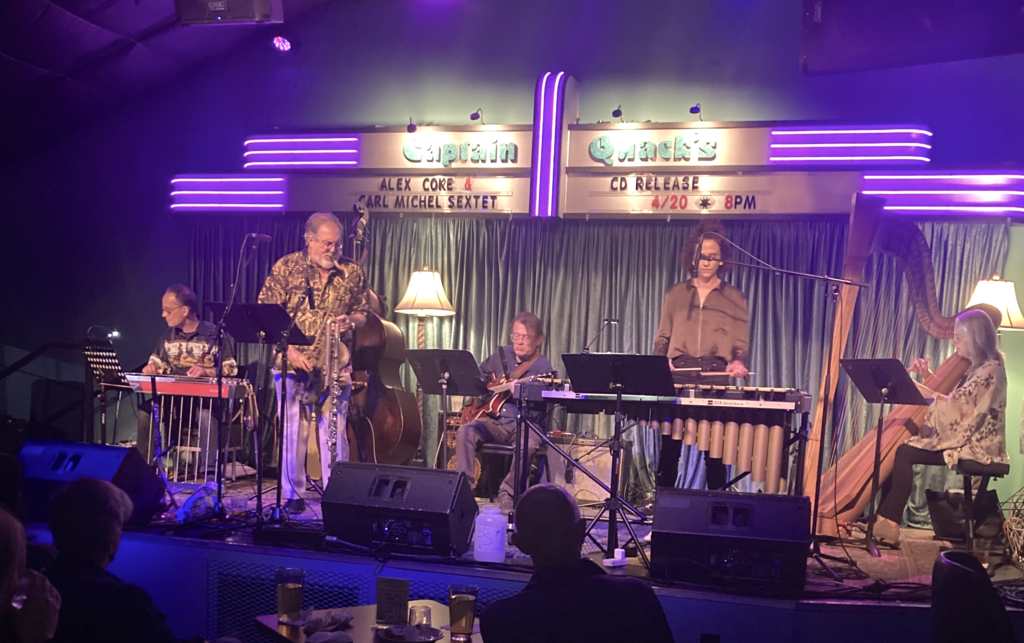
Thursday, November 30, 2023 at Captain Quack’s Soundspace,
Here is a radio interview that Alex Coke & Carl Michel did with Abe Perlstein, host/producer of “Tuesday Lunch With Abe” on 97.3 & 107.9 The Rock, Tuesday 11-14-23.
Thanks to jazzhalo.be for the review of EMERGENCE
Thanks to Jonathan Widman of JW Vibe for the EMERGENCE review.
Thanks to Stephen Smoliar/The Rehearsal Studio for the review of EMERGENCE
Thanks to Jerome Wilson and the folks at ALL ABOUT JAZZ for the review of EMERGENCE !
Review: Alex Coke & Carl Michel Sextet, EMERGENCE Co-leaders make the most of band’s unusual, drumless instrumentation BY MICHAEL TOLAND, FRI., MAY 12, 2023

From a stellar lineup of Austin Texas musicians, Alex Coke/Carl Michel Sextet’s new recording, “Emergence” expands jazz boundaries with a feast of sound.
Shining with an unmistakable power and deep beauty, the unique instrumentation of horns, harp, guitar, pedal steel, contrabass, and vibes speaks in a compelling ensemble voice, while the soloists deliver a virtuosic exploration through intelligent arrangements and new composition.
EMERGENCE IS AVAILABLE NOW ON BANDCAMP
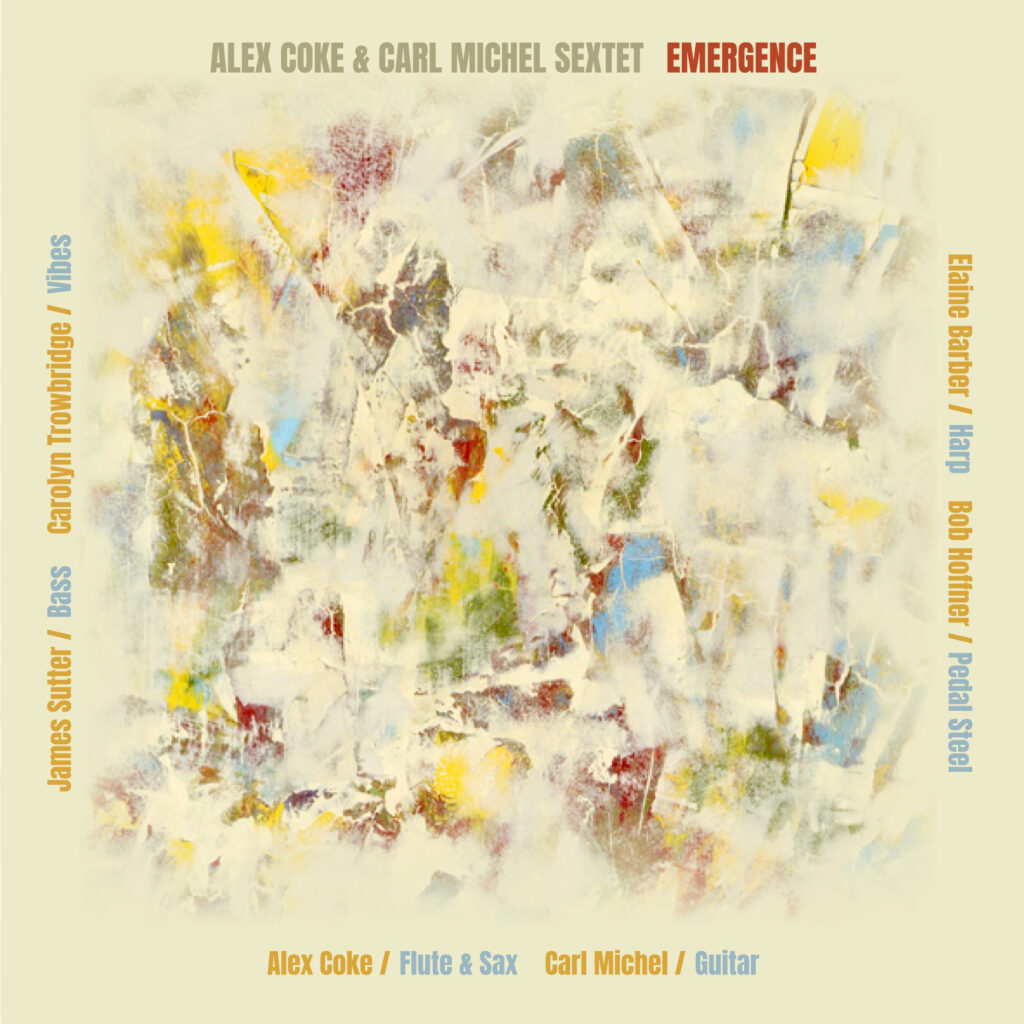
(1-10-2023) Big Shout Out! To Carolyn Trowbridge and Bob Hoffnar for their nominations to The 2022-2023 Austin Music Awards Music Poll.
Vote for Bob Hoffnar and the Mood Illusion in the Best Experimental category and vote for Carolyn Trowbridge in the Best Miscellaneous Instrument category at the Austin Chronicle.
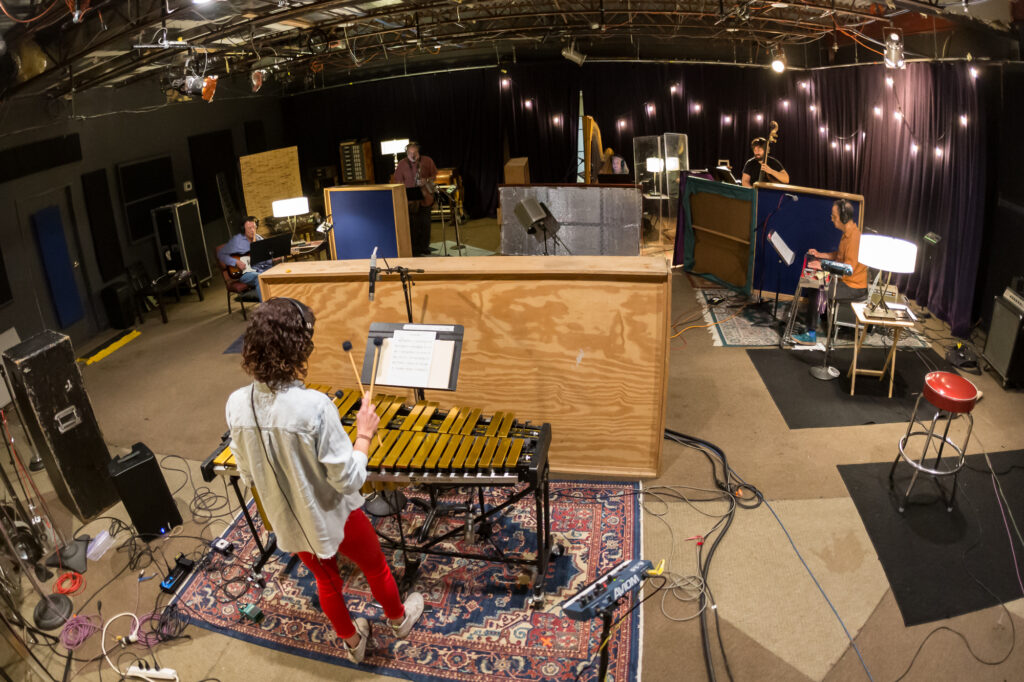
The Alex Coke and Carl Michel Sextet w/ Elaine Barber, Bob Hoffnar, James Suter, Carolyn Trowbridge
Wednesday November 30, 2022 7:30pm
KMFA’s Draylen Mason Studio, 41 Navasota Street, Austin TX 78702
Tickets $20
Jazz composers Alex Coke and Carl Michel will present an evening of their own and others’ works this November in KMFA’s State-of-the-Art Draylen Mason Studio. Leading an ensemble whose members individually excel in several musical genres and, collectively, create a unique and memorable soundprint, saxophonist-flutist Coke and guitarist Michel bring together a group that includes Austin Symphony principal harpist Elaine Barber, pedal steel player Bob Hoffnar (Liminal Sound Series), double bassist James Suter, and percussionist Carolyn Trowbridge on vibes.
Performing compelling music with origins in jazz, classical, folk, extended technique and improvisation, this unique ensemble is an outgrowth of Coke and Barber’s popular weekly Driveway Concert Series that ran from April 2020 through June 2021. The duo performed outdoors, socially distanced, with each member of the sextet individually in turn, appearing as special guests. Playing music as a gift to their local neighbourhood at first, the project took shape as the possibilities for meetings indoors returned.
The Monday night concerts made way for rehearsals, new composition, and the formation of an unusual and very accomplished performing and recording ensemble. They released their first CD together, The Emissary, in October 2021 to good reviews. A second CD is now the works.
For the upcoming performance and live recording, works will include new arrangements of music by John Coltrane, Valentin Silvestrov and Paul Motian with new compositions by Coke and Michel in the mix . Tickets are available from
https://www.eventbrite.com/e/alex-cokecarl-michel-sextet-tickets-404669827347?aff=ebdssbdestsearch
Here are some videos from our Oct. 20, 2021 concert at The Draylen Mason Studio/KMFA, in Austin, TX.
“The Emissary”
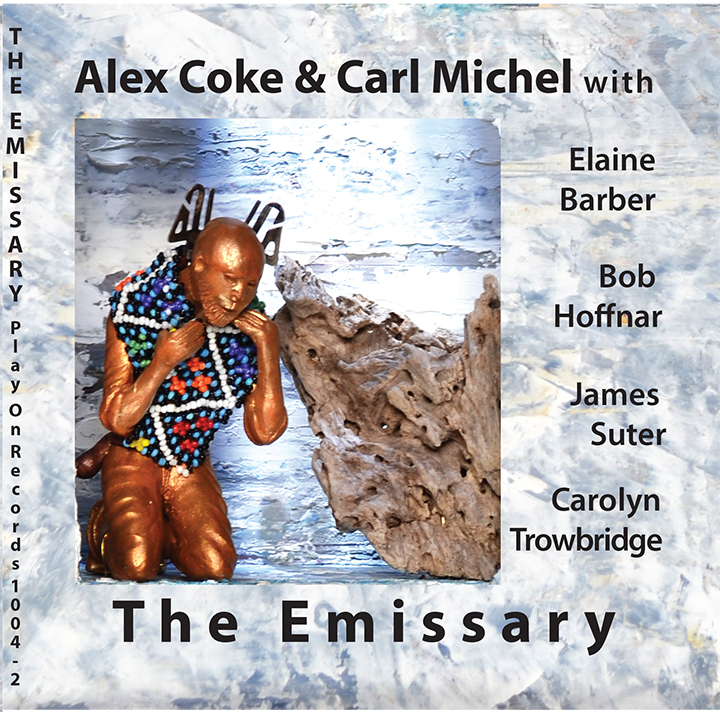
Alex Coke & Carl Michel: The Emissary (All About Jazz April 16, 2022, by Jerome Wilson)
“With instrumentation that includes harp, pedal steel guitar and vibraphone, this album is clearly not meant to resemble a classic jazz session. Instead, it ambitiously incorporates jazz, medieval composition and exotic folk melodies into a hypnotically beautiful set of diverse rhythms and motifs.
The most austere selection is “O Pastor Animarum” by 12th century composer, Hildegarde von Bingen. Here Carl Michel’s guitar, Elaine Barber’s harp, and bob Hoffnar ‘s pedal steel guitar combine into a thick, iridescent weave of drone with grace notes gently tapped out by Carolyn Trowbridge’s vibraphone. Alex Coke’s composition “The Emissary” is more in the spiritual jazz direction of Alice Coltrane. The composer’s flute blowing an Eastern melody through a forest of strings before all the other players take turns billowing out of the thickly murmuring group hum.
There are also livelier tunes in the set. Michel’s composition, “Sol Y Luna,” is a graceful tropical tango which gives Coke’s flute and Trowbridge’s vibes room to dance. “Arabesque,” a Paul Motian tune, has Coke’s tenor sax singing forcefully into the midst of a gauzy harp-led sound bed. “Alterations” is a shuddering free jazz collision where James Suter’s bass and Cole’s flute throbs above the instrumental murmur. The set ends with a trip to Albert Ayler country as Coke burrows his tenor deeply into the Huddie Ledbetter folk song “Go Down Old Hannah.” He shouts and shrieks deep-rooted bluesy passion as the other players vibrate around him.
The production of this album may lack polish but the music still feels immediate and raw. This sextet comes together beautifully in conveying the music’s spacey and earthy elements. They can drift with meditative beauty or roar with passion and their collective sound lingers in the memory. This is a unique and lovely album.”
Alex Coke & Carl Michel manifest The Emissary (The Austin Chronicle January 28, 2022)
“A change of environment always engenders fresh ideas: Veteran Austin jazz musicians Alex Coke and Carl Michel developed new LP The Emissary whilst performing on their driveways during lockdown. The reedist and guitarist channel oxygen and the spirit of Alice Coltrane into a half-dozen free-flowing spiritual jazz tunes. Manipulating saxophones, flutes, guitar, bass, vibraphone, harp, and Bob Hoffnar’s atmospheric pedal steel, Coke and Michel sample catalogs of Leadbelly, Paul Motian, German abbess Hildegard von Bingen, and their own inventory to paint the tracks in grass green, sunset orange, and sky blue – bypassing pandemic limitations and reaching for the ethereal.” – Michael Toland
Alex Coke & Carl Michel: The Emissary: ALLABOUTJAZZ.COM BY KYLE SIMPLER (February 7, 2022)
“While much of the world was in lockdown during 2020, saxophonist Alex Coke and harpist Elaine Barber had an idea that caught on. They decided to bring their instruments out on the driveway of the Austin, Texas home they were sheltering in and play music while waiting for their groceries to be delivered. These impromptu concerts turned out to be popular and soon became weekly events. The Emissary grew out of these concerts.
The Coke-Barber combination opened up new musical paths to follow. Coke’s jazz background blended well with Barber’s focus on classical and early music. With the addition of Carl Michel on guitar, James Suter on bass, Carolyn Trowbridge on vibes and bob Hoffnar on pedal steel guitar, The Emissary was underway. Having a pedal steel player might seem like an unusual choice, but Hoffnar isn’t your run-of-the-mill steel player. While he can certainly play country and western, he also has an ear for modern, experimental music.
This unique combination of instruments reflects the equally unique mixture of compositions, which include jazz, classical, folk, world music, and even blues influences. The album features pieces by Coke and Michel, along with compositions by Hildegard von Bingen, Paul Motian, and Leadbelly. In spite of the eclectic blend of music, the album never sounds disjointed.
The Emissary has a definite jazz foundation throughout. Michel’s “Sol Y Luna,” for example, has a cool vibe that features some excellent solos by Michel and Suter. Coke, who also plays flute, adds some Yusef Lateef flavors here as well. Motian’s “Arabesque” also includes some excellent improvisational moments, and Trowbridge’s work on vibes matched with Coke’s saxophone, gives the song an appealing ethereal quality.
Being a tenor saxophonist, it’s probably no surprise to hear some John Coltrane influences. This comes across in Coke’s playing and in the overall feel of the album as well. There is a spiritual quality present in this album, sometimes reminiscent of Coltrane’s album, A Love Supreme (Impulse!, 1965). This is probably most evident in the Hildegard von Bingen piece, “O Pastor Animarum.” Saint Hildegard, who lived from 1098 to 1179, composed the piece as something of a musical prayer. Here, as with much of Coltrane’s album, the prayer is voiced through the instruments.
The Emissary is a unique album in many ways. It was inspired by Christopher Hynes’ artwork, which is featured on the cover. Hynes’ work is meant to be a form of visual poetry, where one really needs to slow down and pay close attention to the details. The same can be said of the music here. While it might not be easy to place in a single category, this music encourages repeated listening. It has a calming and refreshing quality that invites listeners to discover a peaceful place within themselves.”
Alex Coke- Tenor Sax/Flute/Bass Flute Carl Michel-Guitar Elaine Barber-Harp Bob Hoffnar-Pedal steel James Stuer-Double Bass Carolyn Trowbridge-Vibes 1) Arabesque by Paul Motian 2) O Pastor Animarum by Hildegard von Bingen 3) The Emissary by Alex Coke 4) Sol y Luna by Carl Michel 5) Alterations by Alex Coke 6) Go Down, Old Hannah by Huddie Ledbetter Recorded July 16, 2021 In Austin TX Recording /Mixing: Bob Hoffnar Mastered at Terra Nova by Jerry Tubb Cover Image: The Emissary by Christopher Hynes Cover Layout Olivia Primanis Producers: Alex Coke & Carl Michel Play On Records 1004-2 Available at Bandcamp Also available at: Waterloo Records Antone's Record Shop
Performing compelling music with origins in jazz, classical, folk, extended technique, and improvisation, this unique ensemble is an outgrowth of Coke and Barber’s popular weekly Driveway Concert Series that ran from April 2020 through June 2021.
“Arabesque” by Paul Motian from “The Emissary”
Bios:
Composer and instrumentalist Alex Coke received his B.A. from the University of Colorado at Boulder in 1976, with an emphasis on flute performance, before becoming one of the original members of the Creative Opportunity Orchestra and a touring member of the renowned Dutch ensemble Willem Breuker Kollektief. With a distinctive sound and an inclination toward experimentation, Coke exemplifies the traditions pioneered by fellow Texas tenors and jazz flutists, while expanding the possibilities of extended technique. His projects as bandleader include Live Action Brass Band, Leadbelly Legacy Band, New
Texas Swing with Tina Marsh, and the post-bop quintet, The Worthy Constituents with pianist and composer, Rich Harney. Coke’s extensive discography includes his many projects and his work as a featured soloist with The Austin Jazz Workshop, Greezy Wheels, White Denim, Maryann Price, Accra Trane Station, KlezEdge, Reeds and Deeds, and many others. https://alexcoke.home.xs4all.nl
Elaine Barber is Principal Harpist of the Austin Symphony and a regular guest with San Antonio Symphony. She performs a wide range of chamber music, solos, new music and early music in Austin and Central Texas. She plays with Texas Early Music Project (medieval & renaissance), Austin Baroque Orchestra, Allegro Chamber Trio (classical), Cleo Trio (jazz), and has worked with artists as diverse as Renee Fleming, Gladys Knight, and Shearwater. She’s a passionate teacher and director of the Girl Scout Harp Ensemble, the only known Girl Scout troop made up entirely of harpists. www.elainebarber.com
Pedal steel guitarist Bob Hoffnar relocated to Austin from NYC in 2009 and has since become a major contributor to Austin’s cultural landscape. Originally from Silver Springs, Maryland, Hoffnar graduated from Purchase Conservatory of Music in 1998 with a BFA in Composition that included private studies with Richard Cameron Wolf. Further private studies included time with such musical luminaries as Lamonte Young, Pandit Pran Nath, and Ernest Tubb’s steel player Buddy Charelton. He currently runs the “Liminal Sound Series” which is a live concert performance series dedicated to the commissioning of new works and collaborations between visionary composers and Austin, TX. based musicians and performers. http://www.bobhoffnar.net
James Suter is a bassist hailing from South Florida who recently received a Doctorate in Music and Arts at The University of Texas at Austin. James started his education at The University of Miami wherein he was a member of the prestigious Stamps Jazz Quintet. Following his bachelor’s degree, James then earned a Master’s degree from North Carolina Central University. He has shared the stage with Gary Burton, Chris Potter, Dave Holland, Matt Wilson, Gilad Hekselman, Ellis Marsalis, Branford Marsalis, Jimmy Heath, Andre Hayward, Joe Lovano, Steve Davis, Joey Calderazzo, Ira Sullivan, and many others. James resides in Austin, Texas where he teaches and performs regularly. James is on faculty as a bass instructor at Austin Community College and Temple College.
Originally from Alexandria, VA, Carolyn Trowbridge is an Austin-based percussionist who specializes in vibraphone, marimba, steel pan, and world percussion. Growing up overseas in Gabon, Czech Republic, and Norway, she has a wide variety of musical influences. As an active performer, she performs, records, and tours nationally in a wide variety of styles: soul, funk, pop, jazz, experimental, and rock bands, among others. Carolyn maintains a full studio where she teaches percussion, piano, and improvisation. She received a Bachelors in performance from James Madison University and a Masters in performance from The University of Texas at Austin.
Carl Michel, a graduate of Berklee College of Music, became a co-founder of the Creative Opportunity Orchestra in Austin, TX, with the innovative lead vocalist Tina Marsh. He has released several projects under Play On Records including “Food Of Love,” ”The Carl Michel Group,” “The Carl Michel Group (+)” and “Music In Motian: (The Compositions Of Paul Motian)”. Carl has received two Emmy awards in Music Composition and Arrangement based on his work from a 16-part documentary series about 1930s-2000s pioneering female journalist for the Cleveland Plain Dealer Doris O’Donnell Beaufait titled Doris O’Donnell’s Cleveland.” His music is featured on film soundtracks “The Fourteenth Victim – Eliot Ness & The Torso Murders,” and “Dusk & Shadow – The Mystery Of Beverly Potts.”
Alex Coke & Carl Michel
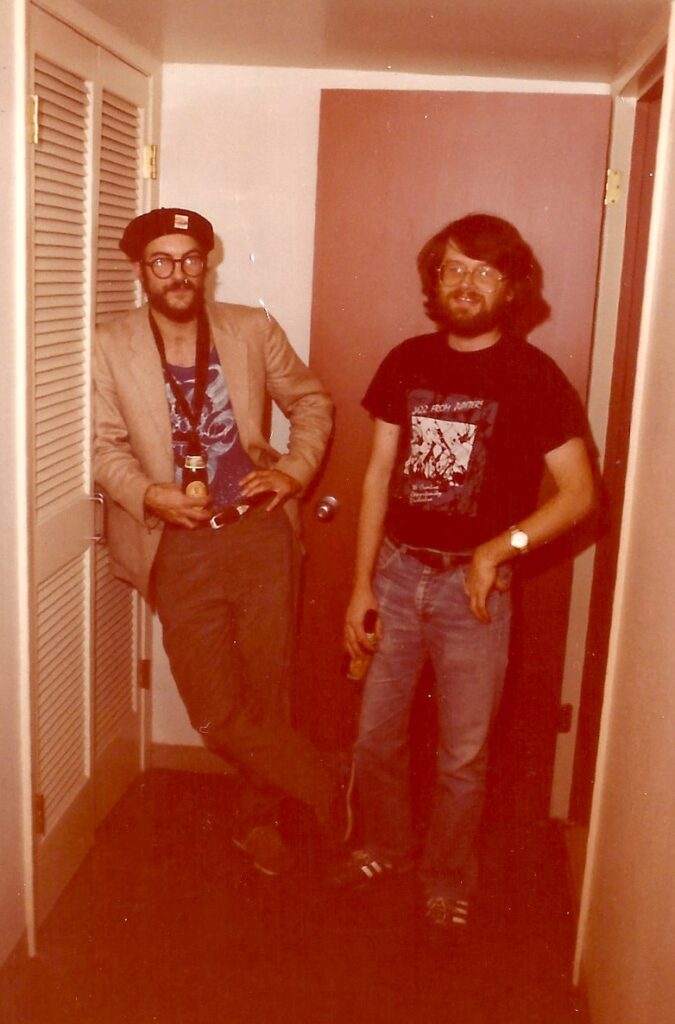
Music In Motian
Promo for “Music In Motian (The Compositions Of Paul Motian)
Recorded at Solid Sound Video editing by Mark Wade Stone/Storyworks.tv
Available At:
“Music In Motian, by Emmy winning guitarist Carl Michel and his quartet of bassist Dan Kolton, drummer Alex Trajano and piano-man Mick Dobday is an astute and finely curated, crisply performed collection of the drummer’s canon” Mike Jurkovic-All About Jazz
“A delightful voyage of the acolyte, Michel and his bunch find the music that was there all along, in Motian’s original works, and gives it the airing he feels it so richly deserves. Really a date loaded with heart and soul.” Midwest Records
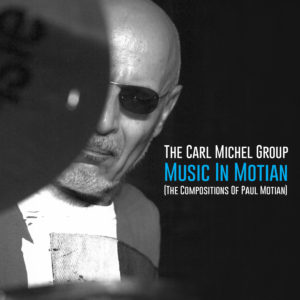
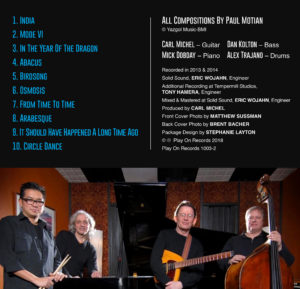
The music of drummer/composer Paul Motian is revered in certain circles of jazz, while resting in obscurity among others. The performing credits of Motian run deep and are extensive, but as a author of highly original music, he lies in the under-documented category. This will not last much longer as, in the years since his passing, his followers are carrying the torch, one such notable being guitarist Carl Michel.
Michel (pronounced Michael) has recognized the contributions of Paul Motian, and he has re-created a complete repertoire of his music. Ann Arbor-based jazz guitarist and composer Michel now has recorded a compendium of Motian’s music played with expert musicians from Southeastern Michigan, a one-of-a-kind tribute to Paul Motian’s music, with adaptations and extrapolations akin to the fertile musical mind Michael is inspired by.
The late drummer Paul Motian was an icon not only among his fellow percussionists but as a composer in his own right. In addition to performing with his own group, he performed with the great pianist Bill Evans’ trio and the legendary Keith Jarrett-led mid-70s small ensemble, while working sidebar gigs with Charlie Haden and Bill Frisell and recording for the Nonesuch, ECM and Winter & Winter labels, among others. Motian became important in many additional ways as a mentor and unique presence in modern jazz.
In his research on and recording of Motian’s music, Michel discovered a blog of Cindy McGuirl, Paul Motian’s niece, who has self-publishing a book, “The Compositions of Paul Motian Volume 1 1973-1989.” Volume 2 of Motian’s compositions will be out early 2018. Her blog, titled “Uncle Paul’s Jazz Closet,” has podcasts of radio shows that she curates featuring her uncle’s music.
As far as Michels’ connection to Paul Motian’s music, it goes back to his early interest in jazz. “I got information from record stores – the first record I had was a Wes Montgomery/Milt Jackson album, then Ralph Towner and Gary Burton. I liked the ECM label and the sound. I fell into John Abercrombie and Pat Metheny pretty hard, but I found a promo copy of Dance by Paul Motian on ECM, and at first I didn’t get it, but I loved the spacious sound, and there was no other drummer so unique. I got acquainted with Keith Jarrett’s American Quartet and Quintet. But it was Paul Motian’s Live In Tokyo that really turned the light on, and I realized so much in his music – elements of Thelonious Monk, Eastern European music and Ornette Coleman coming together in his writing – and it hit a peak.”
“I tried to get in touch with him, wrote to the record label – his music is not in The Real Book – and he graciously sent me 10-12 copies of his music. There’s a lot of depth, and you see how the writing is becoming stronger. By then, he was not touring, only playing in New York, and I went to the Village Vanguard to hear him, Bill Frisell and Joe Lovano. It was religious and mesmerizing. After he passed away in 2011, I was able to meet others through the internet who were interested in his music and had copies and was able to exchange music with them. I wrote his music administrator to see if I could get more, was able to, and did the recording project of which I’m proud.”
Now, as a definitive statement, the music of Paul Motian is available to the world through the keen lens of Carl Michel for all the world to hear, listen to, and deeply enjoy.
1 India 6:42
2 Mode VI 5:57
3 In The Year Of The Dragon 5:37
4 Abacus 5:23
5 Birdsong 1:14
6 Osmosis 3:55
7 From Time To Time 3:50
8 Arabesque 4:08
9 It Should Have Happened A Long Time Ago 4:52
10 Circle Dance 3:49
All Compositions By Paul Motian © Yazgol Music-BMI
Carl Michel – Guitar
Mick Dobday – Piano
Dan Kolton – Bass
Alex Trajano – Drums
Recorded in 2013 & 2014
Solid Sound, Eric Wojahn, Engineer
Additional Recording at Tempermill Studios, Tony Hamera, Engineer
Mixed & Mastered at Solid Sound, Eric Wojahn, Engineer
Produced By Carl Michel
Front Cover Photo by Matthew Sussman
Back Cover Photo by Brent Bacher
Package Design by Stephaine Layton
©℗Play On Records 2018
Play On Records 1003-2
Recordings By Paul Motian That Have Led Me To This Project:
“Motian In Tokyo”
“Motian In Tokyo,” by the Paul Motian Trio, released in 1991 on the JMT label. The trio, featuring Joe Lovano on sax and Bill Frisell on guitar, released eight recordings, three of them were live, this was the first live recording. The CD starts out with “From Time To Time,” one of my favorite Motian tunes. I did a solo version of this for the new CD. It’s a tricky tune to navigate with shifting time signatures. The trio version has some great solo work by Lovano and Frisell. ”Mode VI” is another tune that is on our CD. We play it as a piano/guitar duo, with Mick Dobday on keys. To me it has the construction of a chamber piece. (Joel Harrison has a great version of this on his “Joel Harrison String Choir-The Music Of Paul Motian.”) Also on our new CD is a guitar solo version of “Birdsong,” there are two versions of this on “Motian In Tokyo”. Other songs on “Motian in Tokyo include, “Kathleen Gray,” a ballad by Ornete Coleman/Pat Metheny. I think Ornette’s influence can also be heard on “Mumbo Jumbo” along with “It Is” and “Shakalaka.” Both of these pieces also share some influence from Thelonious Monk. (I believe that “Motian In Tokyo” has the only recorded versions of “It Is” and “Shakalaka.”) “The Hoax” and “Two Women From Padau” complete “Motian In Tokyo.” Both have great beautiful melodies, something for which Motian had a gift for.
“It Should Have Happened A Long Time Ago”
Another album that led me to the recording of “Music In Motian (The Compositions Of Paul Motian) was the first trio album that featured Joe Lovano & Bill Frisell, released in 1985 on the ECM label. One does not expect a drums/sax/guitar trio (What! no bass player?) But what was surprising to me, when I first heard this trio, was that without a bassist, the music seemed to soar. It was if the group was “cut loose” without an anchor holding it down. The title track sets the mood for the the whole album. I’ve considered this tune to be one of Motian’s signature compositions. Versions of this song can be found on albums by Frank Kimbrough, Russ Lossing, Albert Heath w/Ben Street & Ethan Iverson, and Bill Frisell w/Thomas Morgan. Motian would also record this song again w/Lovano & Frisell on “Trioism” and with a trio that featured pianist Geri Allen & Charlie Haden on bass. We recorded this song as a piano/guitar duo with Mick Dobday on keys. I’ve mentioned what I had thought were some of Motian’s influences in a past post. Another influence I hear in his compositions is “world music.” The composition, “It Should Have Happened A Long Time Ago” I believe shows this influence. A simple beautiful melody with a drone like harmony that sounds like a folk song from the past.
When I was going through Motian’s compositions, I came across “India” and was immediately enthusiastic about recording it. I believe the only recording of this by Motian is from the 1985 release. It is such a unique composition, more like chamber jazz piece with a strong soaring melody. To me it is majestic!
The other composition from this recording that is included on our CD is “In the Year Of The Dragon.” This song falls into what more or less could be labeled as “straight ahead jazz,” with chord changes that you would solo over, it could be played with a swing or latin feel. Recordings of this composition can be found on three separate albums by the great Geri Allen/Charlie Haden/Paul Motian trio and by Steve Cardenas, who performed with Motian in The Electric BeBop Band.
“Mysterioso”
In 1982, ECM released “Psalm” by The Paul Motian Band with Joe Lovano on tenor sax, Billy Drewes on tenor/alto, Bill Frisell on guitar and Ed Schuller on bass. This group, with Jim Pepper on tenor replacing Billy Drewes, would release 3 more albums as The Paul Motian Quintet on the Soul Note label. The last recording, released in 1986, by this group was “Mysterioso”. Two Thelonious Monk tunes were featured on this album, the title track and “Pannonica.” I believe this is the first album to contain some of Monk’s compositions with Motian as the leader. The other seven compositions were by Motian. “Abacus,” a song that we included on our CD, is one of them. This song was first released by Motian on “Le Voyage” in 1979 and then later with the Lovano/Frisell trio in1995 and with a trio featuring Jason Moran on piano and Chris Potter on tenor in 2010. Both the 1995 and 2010 versions were recorded live at the Village Vanguard. “Abacus” is one of those songs that that fall under the “free jazz” category, the melody or “head” tying together the open improvised sections. This is a great tune to play on and to explore group improvisation. It sounds like something Ornette Coleman might write.
“At The Village Vanguard”
This trio album, featuring the Motian/Lovano/Frisell trio, released in 1995 that had a version of “Circle Dance,” first released by the same trio in 1987 by the Soul Note label on “One Time Out.” This composition would appear again on “Amaryllis” a recording with Marilyn Crispell on piano and Gary Peacock on bass in 2001. We included “Circle Dance” on our CD. The form for this composition is AABA. The A section has an ostinato bass line that sets up a nice rhythmic groove. The B Section has a variation of the ostinato. The melody, in a Bb harmonic minor key, is made up of whole notes and half notes and reminds me of an Eastern European folk song.
“Holiday For Strings”
In 1993, the JMT label released the first recording of “Paul Motian and the Electric Bebop Band.” This group featured Motian’s reworking of songs from the Bebop era. After the first recording, Motian started to include some original material. The group usually featured two guitars (three guitars on “Garden Of Eden” ECM, 2006), a electric bass and either one or two saxes. Musicians that were in this group at one time or another include: on guitar Steve Cardenas, Jacob Bro, Ben Monder, Kurt Rosenwinkle, Brad Schoeppach and Wolfgang Muthspiel; on sax Joshua Redman, Chris Potter, Chris Cheek, Pietro Tonolo and Tony Malaby; on electric bass Jerome Harris, Anders Christensen, Steve Swallow, and Stomu Takeishi. Don Alias played percussion on “Reincarnation Of A Love Bird,” released in 1994 on JMT. “Holiday For Strings” released in 2002 on the Winter & Winter label featured the beautiful and haunting composition “Arabesque,” which we included in our CD.
“I Have The Room Above Her”
Released by ECM in 2004, this CD featured the Motian/Lovano/Frisell. It was their first recording together since 1995. There were two versions of the composition “Osmosis” on this CD, Part III and Part I. “Osmosis”,” which we included on our CD, represents a form of composition that is more like a creative form of an “art” style music. Most of Motian’s compositions from this album would fall into this category. This style of composition opens itself up to more group improvisation. On our version, I wrote a retrograde of the melody that I titled “Reverse Osmosis,” which we incorporated in the group improvisation.
Recordings By Paul Motian As A Leader Or Sideman
The Tribute Albums, Part I
“Bill Evans”
Much has been written about the iconic Bill Evans Trio that featured Paul Motian and bassist Scott LaFarro. “Portrait In Jazz” (1959), “Explorations” (1961),” Sunday at the Village Vanguard” (1961) and “Waltz for Debbie” (1962) are considered touchstones in the development of the piano trio. I would also include the bootleg recording “Bill Evans Trio Live at Birdland” (1960) mainly for enthusiasts of this trio. But Motian worked with Evans before LaFarro held the bass chair. “New Jazz Conceptions,” released in 1957, was Evans debut as a leader and it featured Teddy Kotick on bass with Motian on drums. What I like about this recording is how Motian provides the support to Evans and the “snap-crackle-pop” to the overall proceedings. (check out the drum solos on “I Love You” and “Conception”). Of note from this recording is the Evans composition “Five,” which Motian would record later on his tribute album that featured the compositions of Evans. The album, “Bill Evans,” was released in 1990 on the JMT label with Joe Lovano on tenor, Bill Frisell on guitar and Marc Johnson on bass.
Two of my favorite Evans compositions included ont he 1990 release are “Re:Person I Knew” and “Very Early.” Both were recorded by the Bill Evans Trio after LaFarros death with Chuck Isreals on bass and Motian on drums and originally released on the 1962 recording “Moonbeams.”
Other compositions from that same recording session that produced “Moonbeams” were “Walking Up,” “34 Skiddoo” and “Show-Type Tune.” These songs would be released on on the album “How My Heart Sings” (1962). Motian also included these compositions on his “Bill Evans” tribute album.
The Tribute Albums, Part 2
“Monk In Motian”
Released in 1988, this recording features the Motian/Lovano/Frisell trio with special guests the great pianist Geri Allen, featured on on “Ruby My Dear” & “Off Minor,” and Motians’ band mate from the Keith Jarrett “American Quartet” days, saxophonist Dewey Redman on “Straight No Chaser” and “Epistrophy.” Motian had an affinity towards the music of Thelounious Monk and featured it on many recordings as well as including it in his live performances. I particularly like the trio performances of “Crespuscule With Nellie” and “Reflections.”
The Tribute Albums, Part 3
The “On Broadway” series
Vol. 1, 2 & 3
There are five recordings in the “On Broadway” series. Volumes 1, 2 & 3 featured the Motian/Lovoano/Frisell trio, with the addition of Charlie Haden on bass. Lee Konitz, alto, joined the quartet on Vol. 3. Vol. 1 was released 1989, Vol. 2 in 1990, and Vol. 3 in 1991. These first 3 volumes were released on the JMT Edition Winter & Winter label.
Songs selected for this series are from the “American Songbook,” not just broadway show tunes. Even though these songs have been covered by many before, it’s nice to hear Motian’s approach to this material. On Vol. 1, we get to hear Lovano & Frisell weave in and out on “Somewhere Over The Rainbow,” with Motian mixing up a rhythmic stew underneath them. The same approach is used on “Last Night When We Were Young,” with Lovano & Motian laying out for Frisells’ solo, and again on “Someone To Watch Over Me,” with the group playing the extended verse at the beginning of the song. The rest of the recording features a variety of up- to mid-tempo arrangements and a somewhat “campy” version of “My Heart Belongs To Daddy,” which the group takes out at the end.
Vol. 2 is a continuation of Vol. 1. The Motian/Lovano/Frisell trio starts the album with the Billie Holiday tune “Good Morning Heartbreak,” a song that they would later release on on the live album “Sound Of Love” (Winter & Winter), recorded at the Village Vanguard in 1995. Other highlights from Vol. 2 include the Van Heusen/Burke “crooner” ballad “Moonlight Becomes You;” four Gershwin songs—“But Not For Me,” “Oh Bess, Where Is My Bess,” and a fun version “I’ve Got Rhythm,” with Motian adding a tag solo at the end; a deconstructed version of “Nice Work If You Can Get It;” and lovely versions of “It Might As Well Be Spring” and “Body And Soul” with the rarely heard opening verse.
For Vol. 3, Lee Konitz joins in and at times adds another layer of overlapping voices. Highlights include: “I Wish I Knew,” a tune that Motian recorded with Bill Evans (Explorations, 1961), this time played as a quartet with Konitz, Lovano, Frisell & Motian; an uptempo vision of “Just One Of Those Things;” a Konitz/Frisell duo on “Crazy She Calls Me;” a Konitz/Motian duo on “The Way You Look Tonight;” the ballad “Handful Of Stars;” and a deconstructed uptempo version of “Pennies From Heaven.”
The first three volumes of the “On Broadway” series offer a nice compliment to the other recordings that featured the Motian/Frisell/Lovano trio and are worth checking out.
6-5-18 Had a great time with Cindy McGuirl and Uncle Paul’s Jazz Closet yesterday. You can check out the podcast/interview at:
The Tribute Albums Part 3 cont.
The ‘On Broadway” series Vol.4 & 5
Paradox
* a situation, person, or thing that combines contradictory features or qualities
Continuity
* the unbroken and consistent existence or operation of something over a period of time
The last two volumes of the “On Broadway” are a departure from the first three volumes, both in personnel and in overall mood.
In August, 2006, Winter & Winter released “Volume 4 or The Paradox of Continuity” featuring The Paul Motian Trio 2000 + One with Chris Potter on tenor, Larry Grenadier on bass, Masabumi Kikuchi on piano (tracks 1, 4, 5, 8, 11) and Rebecca Martin on vocals (tracks 2, 3, 6, 7, 9, 10, 12, 13).
Since Kikuchi and Martin appear on separate tracks, this release has the feel of two albums in one. All of the songs on this recording are ballads or mid tempo compared to the first three volumes that had more varied tempos.
As with the first three “On Broadway” albums, the material is drawn from the “American Songbook.” On the choices of songs featuring vocals, Martin, in an interview with John Dworkin published on All About Jazz in 2006, states, “One of the great things about Paul leading is that he leads but he’s very open. He lets you choose takes, he lets you choose songs…He chose ‘You’re Getting To Be A Habit With Me.’ He chose a couple others; I forget which. But he let me bring stuff in like ‘Brother Can You Spare A Dime?’ …And I brought in ‘A Shanty In Old Shanty Town’ and ‘How Long Has This Been Going On,’ I think, and ‘Tea For Two’ as a ballad…I think my favorite one on Paradox Of Continuity is ‘How Long Has This Been Going On.’ One of the issues for me working on this record was to go back and find all the verses to the songs.”
On recording the album, Martin, in the same interview said, “Paul creates a whole lot of space and yet finds the groove in everything. He’s so spacious and open and in the moment. He’s playing all the time like a kid. It’s beautiful to sing to. And then you’ve got Chris Potter. He’s so strong and has so much to say, so many ideas. . . I like it a lot without a chordal player. I’ve really enjoyed it. It gives me plenty of room to just sing the melody straight. The challenge is to do it with the band and to listen. I mean, you can do that with anything. It doesn’t matter how many players you have. There was something about it that was so open, even though Chris was saying plenty and beautifully. I also thought his sound was great on the record. The engineer was phenomenal on this record. You can mention him (Adrian von Ripka). He blew my mind that guy. . . [But] with me, and this is what I was hearing, Larry was able play more with Paul, and Chris and I were able to have more interplay.” (Thanks to Rebecca Martin for leading me to this interview. You can read the full interview here.)
Whereas the cuts recorded with Martin have a fairly straight ahead approach, or about as straight ahead as Motian will let it, the selections with Kikuchi have a more open approach with more improvisation and contraction/expansion of space. Prior to recording Volume 4, Kikuchi and Motian had established a working history in the trio Tethered Moon, with bassist Gary Peacock, beginning back in 1990 and releasing seven albums.
In an interview from 2012 with Ethan Iverson and published on his blog “Do The Math” (you can read the full interview here), Kikiuchi talked about his first time playing with Motian, “Paul and I started playing together and it was the happening. I think that was our first step into the direction of the style and formation of 2000+One after then. Because drums don’t have exact pitches it’s very easy to handle the key.”
Iverson: “Yeah I guess since working with Paul in ’91 you’ve really developed your own style that sounds like you.”
Kikiuchi: “Because Paul supported me I think. At every moment he tried to. In the beginning I was still stuck basically with the bebop concept but especially since that first meeting I thought, “Oh ok, this is a way I want to go.” It was epoch making. Since then, 2000 + One changed. Drastically changed.”
Kikiuchi on playing with Motian: “When I want him to play with me he plays. I don’t know how it happened. Any way he chose to make a point or anything, I never felt awkward at all. Always with me! Even against me it was always with me.”
And on performing Motians’ compositions, Kikiuchi: “I think I consider Paul’s music to be strong in a couple spots but it mostly gives me inspiration. If I react to it sort of right, he would accept it. That’s what I found each time I played with him. Then we played quite a while together. I think we each built up each our own territory in the charts. But I feel like we built up some kind of groove.”
Iverson: “You got a language together.”
Kikuichi: “Right right, a language yeah. . . Because of that fact. So maybe I’m not playing really the way Paul wanted it to sound like but I can change it, too. He has a kind of ten second phrasing, right? So how are you going to put the accent point of the phrase? If you find it then you don’t have to play a ten second phrase; you could play a two second phrase! Another way to think of the balance is: what he meant, what he heard, what I hear, when we put them together, it comes out this way. As long as you have a responsibility for the part you play, there shouldn’t be any problem there. That’s what the trust is between two musicians. But if you can’t have confidence there then you shouldn’t play together. That, I think, is trust between two musicians. So if he didn’t like it then he would probably stop and given me a chance to think it over or develop it to something else. Then when he feels that he can accept it he’d start playing again. But it’s still musical, it’s a composition right? You’re not playing a kind of written down arrangement or a written down part at all. So it’s negotiable all ways I think. I never thought of it in that kind of way before but when I started playing with Gary and Paul I had to learn it. Even felt like I was behind them and I didn’t like that! I felt I had to stand at the same point that they’re standing. I think in the beginning I was a really good student. I picked up quick. So now I’m majoring in it.”
Some of my favorite cuts from Volume 4 are, with Martin, “Born To Be Blue” and “The Folks Who Live On The Hill” and, with Kikuchi, “Never Let Me Go” (both versions) and “I Loves You Porgy.”
Volume 5 of the series, released in 2009, on the Music Edition Winter & Winter label, retains Masabumi Kikuchi on piano. Loren Stillman on alto Michaël Attias on alto and baritone saxes and Thomas Morgan on bass complete the personnel for this lineup called The Paul Motian Trio 2000 + Two. Because of this line up, Vol. 5 feels like an extension of Vol. 4. minus the vocals. The only difference from this recording vs the others in the “On Broadway” series is that a Motian composition, “Morrock” is included. All of the other selections feature songs from the “American Songbook.” As with Vol.4, the tempos are slow.
Favorite cuts from this recording include “Morrock,” “Something I Dreamed Last Night,” an abstract version of “Just A Gigolo”
Note: It is tempting to include Motian’s last recording as a leader, “The Windmills Of Your Mind,” within the “On Broadway” series. Ten out of the sixteen selections fall under the category of the “American Songbook.” The others are penned by Motian. Along with Bill Frisell & Thomas Morgan, this album features Petra Haden on vocals.
I am impressed with the packaging of the limited hard cover Music Edition Winter & Winter releases. A really nice touch!
The Carl Michel Group
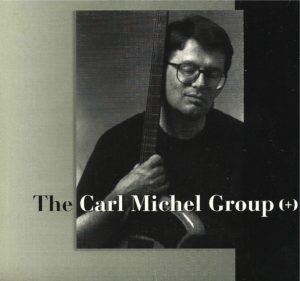
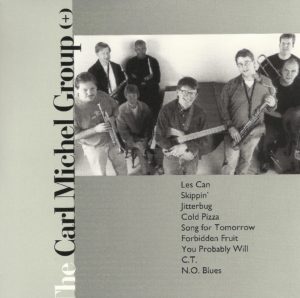
The Carl Michel Group (+) at Bandcamp
The Carl Michel Group (+) at cdbaby
The Carl Michel Group (+) at iTunes
The Carl Michel Group (+) at Google Play
The Carl Michel Group (+) at Amazon
The Carl Michel Group (+) at allmusic.com
All Tunes Composed By Carl Michel Tex Carmichael Music BMI
Carl Michel-Guitar, Gerald Clever-Drums, Michael Graye-Alto Sax, Tim Flood-Bass, Andrew Bishop-Tenor Sax & Clarinet, Ellen Rowe-Piano, Paul Finkbeiner-Trumpet, Chris Smith-Trombone
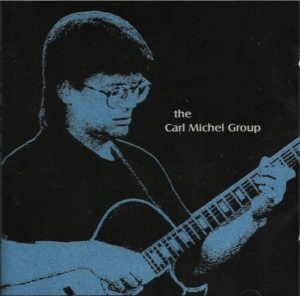
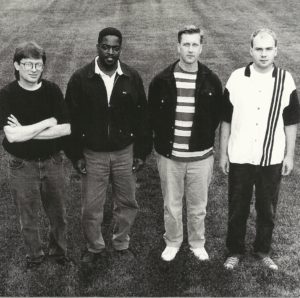
All tunes by Carl Michel-Tex Carmichael Music BMI
Carl Michel-Guitar, Gerald Cleaver-Drums, Michael Graye-Alto Sax and Tim Flood-Bass
The Carl Michel Group CD at Bandcamp
The Carl Michel Group CD at cdbaby
The Carl Michel Group at iTunes
The Carl Michel Group at Google Play
The Carl Michel Group at Amazon
The Carl Michel Group at allmusic.com
Contact & Credits
send email to carlmichel(at)carlmichel.com
Photos by Sudeep Studio
Cover Photo to Music In Motian by Matthew Sussman
Back Cover Photo to Music In Motian and Carl Michel Group Photo by Brent Bacher
Photos for The Carl Michel Group CD Jim Aho
All Compositions on Music In Motian by Paul Motian Yazgol Music BMI
All Other Compositions by Carl Michel Tex Carmichael Music BMI
Book me on BeatGig: beatgig.com/@alexcokeandcarlmichelsextet
